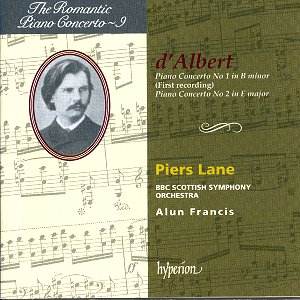Eugen d’Albert was born in Glasgow into a family of
Italian extraction. His family settled in Newcastle-upon-Tyne, over
the border in England, where his father ran his own band and published
a book on ballroom etiquette. D’Albert was one of the first students
at what is now London’s Royal College of Music. He had an astonishing
piano technique, and he distinguished himself by playing the Schumann
Piano Concerto before the Prince of Wales. He went to Vienna at the
invitation of Hans Richter and later studied for a little while with
Liszt at Weimar. He was to become a German composer because Germany
was the centre of music in those days. He never became a German national;
but kept his British passport until the First World War, then became
a Swiss citizen.
D’Albert’s better known and more frequently recorded
E-major Piano Concerto, composed in 1893, is a formidable, short and
concise work. It is cast in one continuous span but in four basic contrasting
movements flowing into each other. It is cyclic in form and written
in the grand "heart-on-sleeve" manner of the late Romantic
tradition, with many taxing, bravura passages contrasted with quieter,
more lyrical sections. It is reminiscent of Liszt and Schumann, particularly
in the opening of the especially appealing slow movement. It abounds
in good tunes. In the rival Berlin recording (0091792 BC) that couples
D’Albert’s captivating Cello Concerto, soloist Siegfried Stöckigt
takes the heroic high road and his reading is fast and very exciting,
leaving one gasping at his risky dexterity. He is very well supported
by Günther Herbig who conducts the Berlin Sinfonie-Orchester in
a big, opulent accompaniment. On this Hyperion recording, Piers Lane
takes a slightly more relaxed view and he is more articulate and poetic,
his hesitations and pauses are as eloquent as his chords. His slow movement
is particularly beguiling. Both interpretations are agreeable depending
on mood.
The earlier Piano Concerto
in B minor is written on a larger scale (it
is nearly forty minutes long). It makes heavy
demands on the soloist – and might be thought
to show off an excessive display of pianistic
virtuosity (of which d’Albert was understandably
very proud.) It was dedicated to Liszt and
it is directed to be played in one movement.
Moments of tremendous late Romantic heroic
bravura contrast with tender romantic melodies.
As Martin Eastick shrewdly observes, "The
B minor concerto is a young composer’s tour
de force and a reminder that at heart
d’Albert remained a pianist rather than a
composer."
Nevertheless this is a very attractive album that will
appeal to all those lovers of grandiloquent "heart-on-sleeve"
piano concertos
Ian and Grace Lace
Complete
Hyperion Romantic Piano Series


